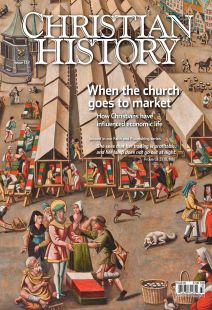Editor's Note: When the church went to market

[Ruins in Ephesus—Dart Johnson Photography]
When I was a little kid, I got an allowance of a dollar a week. I can’t tell you if that was above or below the 1970s average, but I can tell you that it was a dollar. Why? Because every week I took my offering envelope, wrote my name on it in careful first-grader printing, put a dime inside, and took it to church to give 10 percent of my income to God.
My father had come into the ordained ministry from being “in business”; he then tried to get jobs in business with his theological degree and ended up serving for 10 years as a local church pastor. Eventually he became the administrator of a church organization, exactly the kind of job he was made for. All of that made him a rarity in my childhood: a pastor who wasn’t afraid to talk about money—why the church needs it, what giving it does to and for the recipient, and what it does to and for the giver. And very early on, by doing so, he taught me that what I have is not mine; everything is a gift.
Money can be a fraught topic for Christians. This is the second issue in our “Faith and Flourishing” series, and like the first one—on faith and science—it covers a topic that troubles many: the relationship of Christians to economics and the market. (We thank the Kern Family Foundation for its kind support of both issues.) Some Christians would prefer the church not talk about money at all—they claim that doing so is unspiritual and that attempting to make a profit is always exploitative. Other Christians believe that God will bless his followers with material goods if they claim them in faith.
Christians and dollars
You can cherry-pick verses from the Bible to support either of those views. But the real story, as this issue explains, is far more complex. What should Christians think about debt? Can we ever use the market to obtain justice for the oppressed? Are there Christian roots to financial institutions and economic theories? How should Christians give? What is a just wage? Where does faith critique the market, and where does it affirm it? You’ll find thoughts about all these difficult but critical questions and more in these pages. (We also recommend some of our earliest issues—#14 and #19, both on money in Christian history—for even more reflection on these topics.)
When we first started giving my daughter an allowance, we set it at two dollars a week. I didn’t exhaustively research this on mommy blogs or conduct extensive crowdsourcing on Facebook or even calculate for cost of living. I just figured that if I got a dollar a week in 1979, it was probably about time to double the rate.
When I gave it to her, I said, “Now, every week, you take 20 cents out of this and we’ll take it to church.”
“Why?” she said.
“Because,” I said, “your grandpa taught me that all of life belongs to God, including your dimes.” CH
A portion of this letter originally appeared as a blog post on Patheos.org as part of a forum on tithing.
By Jennifer Woodruff Tait
[Christian History originally published this article in Christian History Issue #137 in 2020]
Jennifer Woodruff Tait is Managing editorNext articles
The undeserving poor
Early Christians emphasized doing good for all, whether or not they were worthy
Daniel F. Caner





